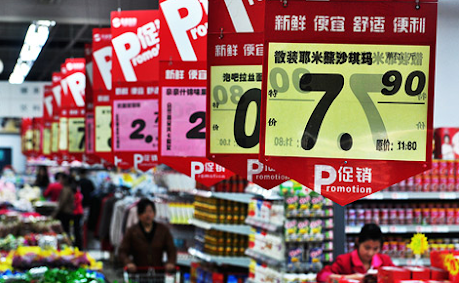Prices are jumping in the United States and around the world, prompting growing warnings that a wave of inflation could threaten the global economy if it persists.
China isn't waiting to find out. Beijing is moving swiftly to protect its factories and workplaces from rising costs. It has discouraged steel makers and coal producers from raising prices.
It has vowed to price-gouging and hoarding. And it has allowed its currency to rise in value to a level unseen in years, giving it a more powerful tool for buying up the world's grains, meat, petroleum, minerals and other essentials.
Rising prices in China, by far the world's biggest manufacturer and exporter, could be felt around the world.
Annabelle New York, a New York based importer and distributor that sells down-filled parkas and other high-end apparel to department stores and other retailers, raised prices 10 percent this spring. But the company's costs for merchandise from China are up 20 percent, said Bennett Model, the company's chief executive and president.
Chemicals to make the parkas' synthetic fabric shells have become costlier as world oil-prices rise. Down feathers, for which China is the world's dominant producer, have become more expensive.
And trans-Pacific freight costs have tripled for some shipments as air cargo companies and shipping lines have struggled to keep up with the demand.
Only the fear of losing customers has prevented Mr. Model from passing along higher costs to American stores. He has accepted narrower profit margins instead.
''If I really wanted to cover all the increases, the prices would be prohibitive right now,'' he said.
It's far from certain that the current bout of global inflation will last. Many economists believe price increases will moderate once companies clear supply bottlenecks caused by factory closings and other measures taken during the coronavirus pandemic.
But China has clear reasons to fear inflation. Its breakneck economic growth over recent decades has periodically been accompanied by surging prices that provoked anger across the country.
Rising prices contributed to the demonstrations in Tiananmen Square in Beijing in 1989. The authorities have long used informal price controls and subsidies to prevent rising costs from being felt in China's supermarkets and at the family dinner table.
For some goods, prices are indeed rising. Paper manufacturers have raised bulk volume prices for products like napkins and toilet paper four times this spring. Soybeans for tofu are becoming costlier.
But for now, Chinese manufacturers, rather than consumers, are feeling the price increases. Wholesale prices in China were almost 7 percent higher in April than a year earlier, when the pandemic was holding down prices. Costlier iron ore from Australia and corn from the United States account for much of that rise.
At a recent cabinet meeting, Premier Li Keqiang ordered officials to ''resolutely crack down on monopoly and hoarding in accordance with the laws and regulations, and strengthen market supervision.
Vendors at a covered market in Shanghai said on a recent afternoon that they saw no sign yet of rising food prices. Egg and beef prices, for example, were little changed.
''The cost of living hasn't changed much, the price of green vegetables is always'' about the same, said Yang Yuxia, who has been selling eggs from chicken, pigeon and other birds at a stall there since 1998.
But merchants for foods that are not staples were already watching warily for price increases by their suppliers.
''Of course I'm worried if the price going up - if the prices go up, I will have fewer customers,'' said Gao Hong, a vendor of freshwater eels and shrimp at a store.
At a higher level, Chinese officials have simply sat back and let global forces make the currency stronger. As the United States has borrowed and spent heavily in recent months to counteract the economic effects of the pandemic, the dollar has started to slide against many currencies, including the renminbi but also the euro.
''The appreciation of the renminbi is driven by the good performance of the Chinese economy,'' said Garry Liu, an independent economist in Shanghai. 'The U.S. is now producing too much money supply, and as result the dollar is going soft.
A stronger currency has its downsides, however, and Chinese officials appear to be stepping in to halt further increases. The stronger currency makes Chinese goods less appealing in other markets. For now, the world seems happy to keep buying Chinese made goods anyway. Still, the People's Bank of China warned that further appreciation was a one-way bet.
In the meantime, the stronger renminbi could push up the price of Chinese-made goods in the United States, adding to price pressures there, though in mostly moderate ways.
A U.S. Bureau of Labor Statistics index of average prices for imports from China shows that prices fell about 2 percent from the summer of 2018 and until the start of the pandemic and then level off. Now those prices have jumped 2 percent since November.
''Is China exporting inflation?'' said Louis Kuijs, a China specialist at Oxford Economics. ''In renminbi terms, it's not so obvious. But in the U.S, dollars term, it starts to get more sizable.''
The World Students Society thanks author Keith Bradsher.

.png)


0 comments:
Post a Comment
Grace A Comment!